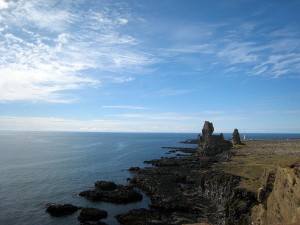Ready, steady, recite! Posted by hulda on Sep 5, 2012 in Icelandic culture, Icelandic history, Uncategorized
 Did you know that the world tungl (= moon)* has been said to be the hardest word of Icelandic to rhyme?
Did you know that the world tungl (= moon)* has been said to be the hardest word of Icelandic to rhyme?
According to a story by Jón Árnason there’s only ever been one man capable of finding a rhyme for it, a famous skáld (= poet) called Kolbeinn Jöklaskáld (= Kolbeinn glacier poet). One time Kolbeinn sat at Þúfubjarg (= tussock cliffs) with the devil and they competed in composing poems. For the first half of the night the devil would compose the first two lines and Kolbeinn would have to find a match for them, then they would change this so that for the rest of the night it would be Kolbeinn’s turn to begin the poems. If either one could not answer the other he would be thrown down the cliffs.
The competition went on through the night, neither side proving to be less smarter than the other. Finally Kolbeinn took his knife, held it up towards the full moon and started a poem with these lines:
Horfðu í þessa egg, egg
undir þetta tungl, tungl.
The devil tried and tried but eventually he had to give up and said: “That is not poetry anymore, Kolbeinn!”
Kolbeinn then continued the poem himself thus:
Ég steypi þér þá með legg, legg
lið sem hrærir ungl ungl.**
So was the devil thrown down from the cliffs and into the sea, and never again tried he to compete with Kolbeinn Jöklaskáld in poetry.
This is the site of the competition, Þúfubjarg.
Iceland is full of stories of clever men and women besting the devil in his game. Sæmundur fróði Sigfússon is probably the best known of them – you may remember him from this post. Yet Icelanders have an especially soft spot for the most famous of their poets. It’s not unusual that legends spring up around real historical figures after some amount of time has passed from their death. Hallgrímur Pétursson, a 17th century poet and a priest, reputedly once got annoyed at a fox and “poemed” it so heavily it sunk into the ground! Poetry – serious business.
In times past a good poet was considered a type of a magician capable of miracles, especially the kind that sway people to their side no matter what. The oldest example I can think of is Egill Skallagrímsson who was famous for his prowess on this field. He was a rather difficult person to deal with, and eventually he angered king Eirikur Bloodaxe so badly that he had Egill imprisoned and sentenced for execution. However, Egill composed, memorized and recited such a powerful drápa (= a type of a long poem written in someone’s honor) to the king that he decided to spare his life. This poem is called Höfuðlausn (= Head’s ransom).
A modern type of Höfuðlausn downtown Reykjavík.
An interesting additional note is that poetry was not considered a skill, rather it was thought of as a gift. Therefore it could be taken away if the poet misused it. The forbidden ways of using it included f.ex. causing someone’s death or seducing someone, so be careful out there! I know it’s traditionally considered an appropriate tool for winning a maiden’s heart but it might not be so advisable to use it for that purpose after all…
*Icelandic has two words for moon: tunglið and máninn.
**I tried my all to translate this poem but I gave up when this was what I came up with:
“Look at this blade, blade / Under this moon, moon / I cast you with a leg, leg / joint that stirs the wrist, wrist.”
…yeah, I didn’t think so either. If anyone knows the real translation of this poem I’d be eternally grateful because now I’m really dying to know.

Build vocabulary, practice pronunciation, and more with Transparent Language Online. Available anytime, anywhere, on any device.
About the Author: hulda
Hi, I'm Hulda, originally Finnish but now living in the suburbs of Reykjavík. I'm here to help you in any way I can if you're considering learning Icelandic. Nice to meet you!






Comments:
Cristina:
Just thinking … Could drápa be translated as ‘ode’?
Thanks for the interesting story.
hulda:
@Cristina In a way – yes – and in a way no. Drápa has the same function as an ode but the structure differs. Then again this particular drápa, Höfuðlausn, does follow the basic rules of an ode. This was a really interesting question by the way!